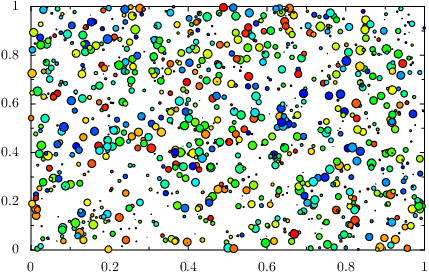PyX — Example: graphstyles/changesymbol.py
Add functionality to existing graph styles

import random from pyx import * # introduce a new symbol style where size and color are given by some data class changesymbol(graph.style.symbol): def __init__(self, sizecolumnname="size", colorcolumnname="color", gradient=color.gradient.Rainbow, symbol=graph.style.symbol.circle, symbolattrs=[deco.filled, deco.stroked([color.gray.black])], **kwargs): # add some configuration parameters and modify some other self.sizecolumnname = sizecolumnname self.colorcolumnname = colorcolumnname self.gradient = gradient graph.style.symbol.__init__(self, symbol=symbol, symbolattrs=symbolattrs, **kwargs) def columnnames(self, privatedata, sharedata, agraph, columnnames, dataaxisnames): # register the new column names if self.sizecolumnname not in columnnames: raise ValueError("column '%s' missing" % self.sizecolumnname) if self.colorcolumnname not in columnnames: raise ValueError("column '%s' missing" % self.colorcolumnname) return ([self.sizecolumnname, self.colorcolumnname] + graph.style.symbol.columnnames(self, privatedata, sharedata, agraph, columnnames, dataaxisnames)) def drawpoint(self, privatedata, sharedata, graph, point): # replace the original drawpoint method by a slightly revised one if sharedata.vposvalid and privatedata.symbolattrs is not None: x_pt, y_pt = graph.vpos_pt(*sharedata.vpos) color = self.gradient.getcolor(point[self.colorcolumnname]) privatedata.symbol(privatedata.symbolcanvas, x_pt, y_pt, privatedata.size_pt*point[self.sizecolumnname], privatedata.symbolattrs + [color]) g = graph.graphxy(width=10) g.plot(graph.data.points([[random.random() for i in range(4)] for i in range(1000)], x=1, y=2, size=3, color=4), [changesymbol()]) g.writeEPSfile("changesymbol") g.writePDFfile("changesymbol") g.writeSVGfile("changesymbol")
Description
In this example demonstrate how graph styles can be modified to add further functionality to them. Here we create changesymbol styles based on PyX's symbol style. For that two additional column names are introduced that way, that they can be modified in the constructor of the style. The column names are then registered by the adjusted version of the columnnames method. After that we only need to replace the drawpoint method by a modified version, which implements the additional functionality. This new created style can than be used like any other graph style.
